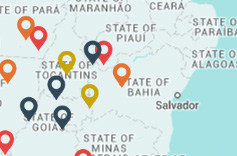Association for Environmental Protection, Federal District (APEMA)
Hydroelectric Plants and Human Rights Violations: 25 years of experience with the Tucuruí Hydroelectric Dam
Distrito Federal
APEMA promotes educational activities to defend the environment and develop economic alternatives to defend human life and nature, together with the communities affected by hydroelectric dams. The association also encourages work that fosters the organization, participation, and solidarity of communities affected by dams, seeking public policies that meet the population’s needs.
APEMA builds on the 25 years of empowerment and capacity-building work by the Movement of Communities Affected by Hydroelectric Dams (MAB). Discussion with the families focuses on Brazil’s energy model and possible forms of resistance for people to remain in their original communities.
The association creates spaces for on-going empowerment of the families (children, youth, adults, and the elderly) in the areas of production, education, marketing, culture, and politics, seeking to ensure the families’ rights and build a more just society.
According to APEMA, more than two thousand dams have already been built in Brazil, displacing more than a million people from their communities, with no fair compensation for 70% of this population. This reality becomes an important part of rural exodus and pockets of poverty in large Brazilian cities.
The Tucuruí Hydroelectric Plant was built 25 years ago by Centrais Elétricas do Norte do Brasil S.A. (Eletronorte) on the Tocantins River in the State of Pará, in the Brazilian Amazon, and flooded areas in the counties of Breu Branco, Goianésia do Pará, Itupiranga, Jacundá, Nova Ipixuna, Novo Repartimento, and Tucuruí downstream to the dam, and Cametá, Baião, Igarapé-Miri, Mocajuba, and Limoeiro do Ajuru. The liabilities have still not been resolved, and the situation involves permanent violation of the communities’ rights.
Also according to APEMA, there is no comprehensive legislation in Brazil to define and enforce the rights of families affected by hydroelectric dams, or even a government agency in charge of conducting compensation and resettlement of these families, who are left at the mercy of the hydroelectric companies (whose primary aim is profit).
According to the Association, such hydroelectric dams violate human rights and dignity, preventing individual and collective restructuring of life, with severe impacts on identity, self-esteem, and future prospects for the affected families.
The Project
With the project Hydroelectric Plants and Human Rights Violations: 25 years of experience with the Tucuruí Hydroelectric Dam, APEMA fights to reclaim the rights of families in Pará affected by the dam. Land, housing, credit, health, and education are the main areas of work.
The association will also take initiatives to recover and develop the affected area, allowing the reorganization, organization, and empowerment of the river-dwelling communities and other groups belonging to the areas of work of the affected families.
The idea is to build a collective agenda of demands to improve people’s quality of life, together with the various existing organizations in Tucuruí, to subsequently lobby the government and electric utility companies to open avenues for negotiation and provide concrete solutions for the population.
Based on this agenda, APEMA will submit public policy proposals at meetings, seminars, and conferences held by the Federal, State, and Municipal government or civil society organizations and will develop campaigns at the national and international levels to denounce the dam projects in Brazil and their serious consequences for human rights.
One of the activities provided under the grant is to produce a video on dam construction in Brazil and specifically the case of the Tucuruí Hydroelectric Dam 25 years after its construction.
Funding Line
Annual Call for Proposals
Year
-
Total Granted
-
Duration
-
Main Themes
Social and environmental rights within mega-projects






